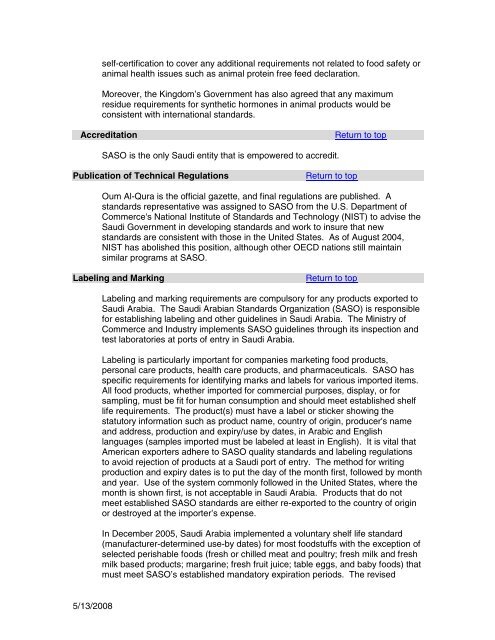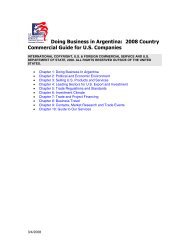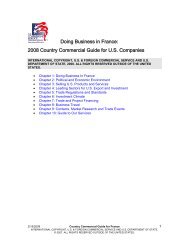Doing Business In Saudi Arabia - Bna
Doing Business In Saudi Arabia - Bna
Doing Business In Saudi Arabia - Bna
Create successful ePaper yourself
Turn your PDF publications into a flip-book with our unique Google optimized e-Paper software.
5/13/2008<br />
self-certification to cover any additional requirements not related to food safety or<br />
animal health issues such as animal protein free feed declaration.<br />
Moreover, the Kingdom’s Government has also agreed that any maximum<br />
residue requirements for synthetic hormones in animal products would be<br />
consistent with international standards.<br />
Accreditation Return to top<br />
SASO is the only <strong>Saudi</strong> entity that is empowered to accredit.<br />
Publication of Technical Regulations Return to top<br />
Oum Al-Qura is the official gazette, and final regulations are published. A<br />
standards representative was assigned to SASO from the U.S. Department of<br />
Commerce's National <strong>In</strong>stitute of Standards and Technology (NIST) to advise the<br />
<strong>Saudi</strong> Government in developing standards and work to insure that new<br />
standards are consistent with those in the United States. As of August 2004,<br />
NIST has abolished this position, although other OECD nations still maintain<br />
similar programs at SASO.<br />
Labeling and Marking Return to top<br />
Labeling and marking requirements are compulsory for any products exported to<br />
<strong>Saudi</strong> <strong>Arabia</strong>. The <strong>Saudi</strong> <strong>Arabia</strong>n Standards Organization (SASO) is responsible<br />
for establishing labeling and other guidelines in <strong>Saudi</strong> <strong>Arabia</strong>. The Ministry of<br />
Commerce and <strong>In</strong>dustry implements SASO guidelines through its inspection and<br />
test laboratories at ports of entry in <strong>Saudi</strong> <strong>Arabia</strong>.<br />
Labeling is particularly important for companies marketing food products,<br />
personal care products, health care products, and pharmaceuticals. SASO has<br />
specific requirements for identifying marks and labels for various imported items.<br />
All food products, whether imported for commercial purposes, display, or for<br />
sampling, must be fit for human consumption and should meet established shelf<br />
life requirements. The product(s) must have a label or sticker showing the<br />
statutory information such as product name, country of origin, producer's name<br />
and address, production and expiry/use by dates, in Arabic and English<br />
languages (samples imported must be labeled at least in English). It is vital that<br />
American exporters adhere to SASO quality standards and labeling regulations<br />
to avoid rejection of products at a <strong>Saudi</strong> port of entry. The method for writing<br />
production and expiry dates is to put the day of the month first, followed by month<br />
and year. Use of the system commonly followed in the United States, where the<br />
month is shown first, is not acceptable in <strong>Saudi</strong> <strong>Arabia</strong>. Products that do not<br />
meet established SASO standards are either re-exported to the country of origin<br />
or destroyed at the importer’s expense.<br />
<strong>In</strong> December 2005, <strong>Saudi</strong> <strong>Arabia</strong> implemented a voluntary shelf life standard<br />
(manufacturer-determined use-by dates) for most foodstuffs with the exception of<br />
selected perishable foods (fresh or chilled meat and poultry; fresh milk and fresh<br />
milk based products; margarine; fresh fruit juice; table eggs, and baby foods) that<br />
must meet SASO’s established mandatory expiration periods. The revised












